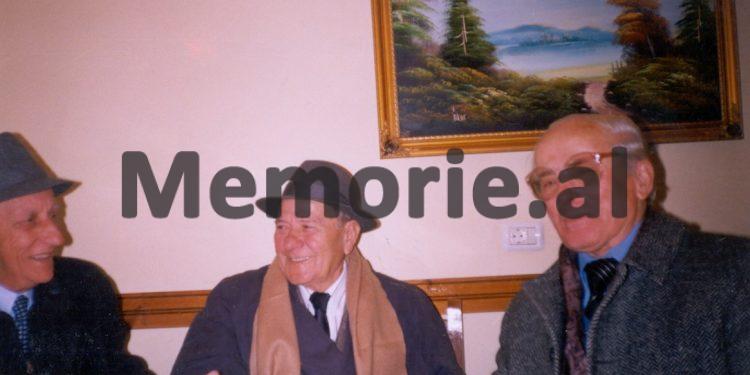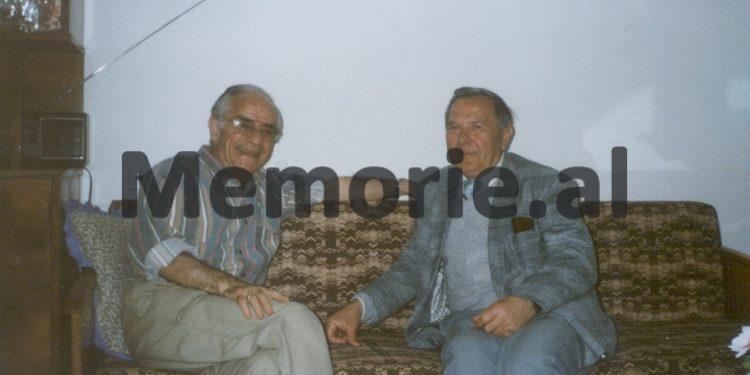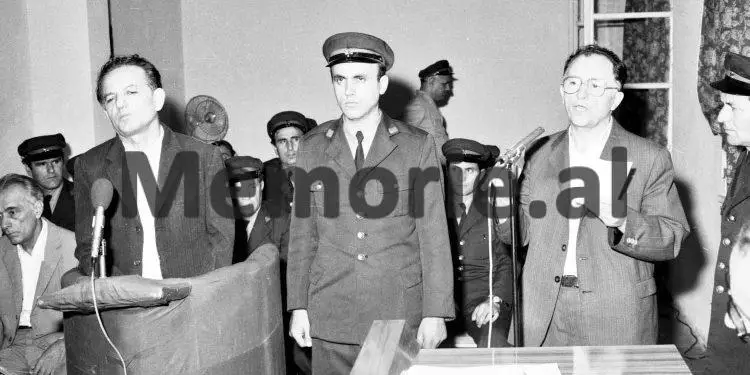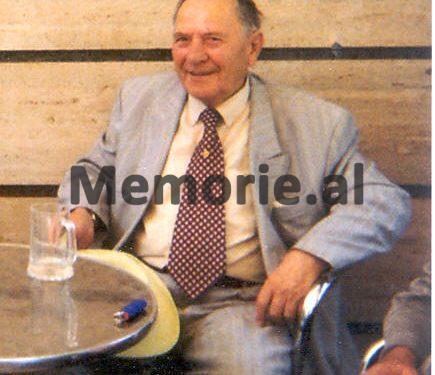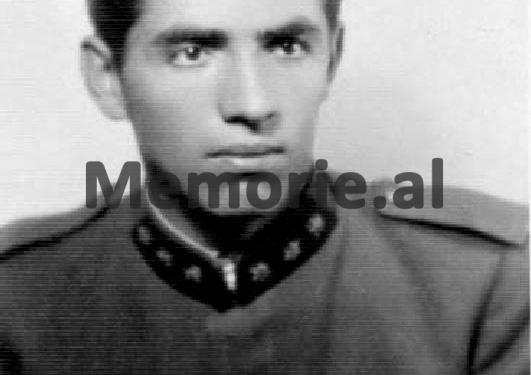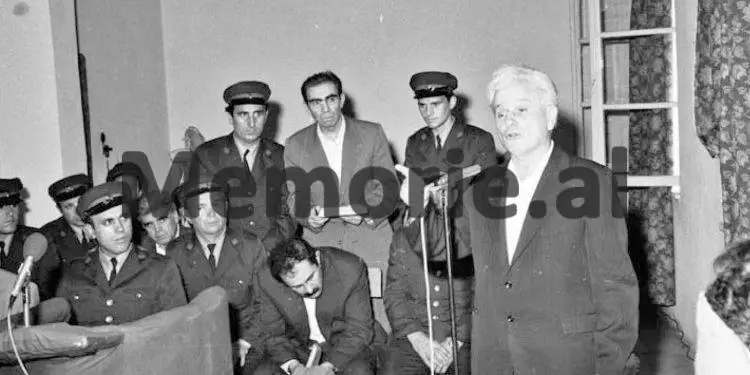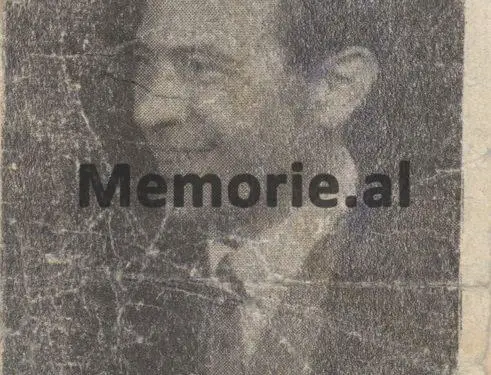Dashnor Kaloçi
Memorie.al publishes the unknown story of Ahmet Beqo Nivica, originally from the village of Kurvelesh, from where he inherited the surname, who after being educated in the Vlora Commercial, during the Anti-Fascist War was the commander of the Balli Kombëtar Youth Squads in the Region of Gjirokastra and at the end of 1944, he was able to leave Albania with some of the main exponents of the nationalist organizations of the National Front and Legality, such as Mit’hat Frashëri, Hasan Dosti, Abaz Kupi, etc., settling in Italy in camps of political asylum seekers who had opened up Anglo-Americans at the time.
Ahmeti’s departure from Italy to France together with Sadik Premten, as he was in danger of being arrested and appearing in court, accused of killing several Italian captives in Selenica, Vlora in 1943 and settling in Paris where he studied. higher graduating in Chemical-Industrial. Ahmeti’s friendship with some of the Albanian political emigrants who were in France at that time and also his closeness and very close friendship with Llambi Peçini, who performed the duty of the Albanian Intelligence officer, at the Albanian embassy in Paris, disguised as a diplomat.
Repatriation of Ahmet Nivica in 1958 in Albania after an amnesty granted by the then communist regime and his appointment as head of a Commercial Enterprise in the city of Elbasan, where then the Minister of Internal Affairs Kadri Hazbiu, together with the President of The Internal Affairs Branch, Shim Kolli, called him and asked him to cooperate with the State Security organs, approaching some people who intended to flee abroad and would seek his help. Ahmeti’s refusal to work for the Security and his arrest in 1960, being sentenced to many years in prison, which he suffered in the Spaç camp from where in 1983 he was taken and brought to “Ward 313” in Tirana, asking him to testify against Kadri Hazbi and Llambi Peçini
“In the premises of Prison 313 in Tirana, at that time there were also cells where Kadri Hazbiu, Feçorr Shehu, Llambi Peçini, Llambi Ziçishti, Nesti Nase, and some others who were considered as their collaborators were kept isolated under strict security measures… As they were taking me to the special investigation which was a real hell of iron doors opening and closing with a frightening noise, climbing the stairs, we were confronted by an officer and a civilian who were coming down. As soon as we approached one-meter distance with the two of them, the officers accompanying me stopped me and turned me on my back, so that we would not look at each other. “But I recognized very well the man who was the former chief investigator of the Republic, Nevzat Haznedari.” The man who speaks and testifies for Memorie.al, is Ahmet Nivica, former commander of the Youth Front National Squads during the war years and then a political emigrant in Italy and France until 1958, who tells his whole adventure with senior State Security cadres asking him to testify against former Security Director for senior leadership Llambi Peçini and Interior Minister Kadri Hazbiu.
Who is Ahmet Nivica and what activity did he carry out during the years 1949-1958 when he was a political emigrant in France? What did the secret services of some western countries ask of him and why did they put as a primary task that he should recruit the first secretary of the Albanian embassy in Paris, who then returned to Tirana and for many years held high positions in the Security of State? What were they talking about in the Paris cabaret until late at night, the Albanian political emigrant, with his compatriot, who actually exercised the duty of Chief of Security, but camouflaged under the guise of a diplomat? What did they ask each other and why did Ahmet Nivica persuade to return to Albania in 1958? Who received him at the Rinas airport, what statement did he give to the journalist Petrit Mullisi and who were the people who first visited him in the hotels “Volga” and “Dajti”?! Where did Ahmet Nivica settle down and what were his relations with Llambi Peçini, the former diplomat of the Albanian embassy in Paris, who after returning to Tirana, became the right wing of Mehmet Shehu and Kadri Hazbiu? What did Kadri Hazbiu and Shim Kolli ask Ahmeti in 1963 and why did he refuse to serve them?
Follows from the previous number
Mr. Ahmet, you said above that the anti-communist circles with which you were associated, were suggested to be associated with Llambi Peçini, because he also belonged to a clan in the top communist leadership of Albania, which aimed to overthrow Enver. How did you know that fact about Peçin, did he tell you that, and vice versa, did you tell him the intentions of the anti-communist circles with which you were connected and worked?
Absolutely, Llambi Peçini had never spoken openly to me about the clan he belonged to in the senior Albanian leadership or the goals that clan had. Likewise, I had never spoken openly to him about the tasks that had been given to me, but this was left to be easily implied by the conversations we had with each other. It was not at all difficult for both of us to understand what our goals were.
You said that they had been given tasks for Peçin. Apart from the Albanian anti-communist circles you mentioned above, can you tell us if anyone else was hiding behind you. In a word, who were the ones who forced you to meet and make friends with Peçin and what tasks were given to you?
Yes, at the beginning of 1957, a person came to me and met me as a courier of the Prefecture or Municipality. He told me that I had to show up at a place in town X on Bear Street and that some people would be waiting for me there. At the end of his speech, he told me that I would do well to go to that place, because it was for my own good. I agreed to go where I was told and I immediately realized that those who were looking for me were secret services, but I did not know exactly where. People who contacted me told me that they were working to overthrow the government of Enver Hoxha and asked me to cooperate with them, mentioning some names of people I knew. According to them, they too had signed the cooperation and continued to work for that agency network.
Who is this agency network about and what concrete task did they give you?
They were several agency networks that worked closely with each other. But I can tell you that one of them was and is currently one of the most powerful intelligence networks the world has today. As a start, they asked me to recruit the First Secretary of the Albanian Embassy in Paris, Llambi Peçinin, who was in fact acting Chief of Intelligence for Western countries and was hiding under the guise of a diplomat.
How did you respond to their request to cooperate with them?
At first, I was hesitant to say that I was basically for the overthrow of the communist government of Enver Hoxha and for this I had given evidence by fighting with weapons in hand against them since the years of the War. But that fact, of course, did not mean that I became a spy.
Did they insist on their request and how was that problem closed?
After five hours of discussion, (from 1pm to 6pm) having no other recourse, I gave my word that I would work for them and signed some documents that they put in front of me to sign.
After that, how did you connect with Llambi Peçini. Who was the person who introduced you to him?
After signing the cooperation with them, I set to work to find the opportunity to get in touch with Peçin and the person who knew him was Salvator Pistuli, originally from Shkodra. I asked Salvator to give me a chance to meet with Peçini, telling him that I wanted to return to Albania and that he, as an embassy diplomat, could help me with that. Salvator introduced me to Llambi and after that meeting I formed a close friendship with him. We both constantly drank together in the bars and cabaret of Paris, where there were occasions when we had breakfast.
How did you know that Llambi Peçini belonged to a clan of the senior Albanian communist leadership which was a rival and intended to occupy the post of Enver?
Given the fact that the foreign secret services I was in contact with insisted that I recruit him, this was not difficult to understand. “So, they were aware of his connections with the leadership clan in Tirana, as well as the intentions of that rival clan of Enver and therefore sought to recruit him.”
After the many meetings you had with Peçin, how did you act to recruit him?
As a start, I wanted to tell you that after the tasks I received from the foreign secret services, with which I signed the declaration of cooperation, I informed the Commander-in-Chief of Balli Kombëtar, who was operating in the Albanian diaspora of western countries, and he said: “Continue the task given to you, because this is also in the interest of our cause.” But even after the approval I got from the Balli commander, I was put in a very difficult position and did not know how to act. I had no desire to get into those big jobs, as I knew very well that there was also the risk of my physical elimination. Likewise, although Llambi Peçini was a communist, I did not want to hand him over to foreign secret services. Given the great dilemma in which I found myself, I decided to consult with a close friend of mine, a former Russian officer and rabid anti-communist, (known as Ismail) telling him everything that had happened to me. After listening to me attentively, he told me, “Know that if you do not do the task assigned to you, they will kill. These are strict rules that agencies have and they could not break, otherwise they are deconspired and come out completely discovered”.
What did you do after consulting with your Russian friend?
I fell into a very difficult situation, as the foreign agency constantly asked me for reports on what I was doing for the task that was assigned to me. Based on this fact, I decided not to work for this purpose and again consulted with an Albanian friend of mine named, Anton M. originally from Shkodra. He agreed with me that we both return to Albania. After that I went and met again the Commander-in-Chief of the National Front and he approved my request to return to Albania.
But how did he approve their request to return to Albania, when he had previously told them to continue the task of recruiting Peçin?
First, that he had a lot of confidence in me, and second, even here in Albania, I would come with other tasks that I took from that same person. In short, he approved my request to return to Albania, following the tasks he had previously assigned me.
Were you not afraid that when you came to Albania you would be imprisoned, because you were on the list of “War Criminals” published by the communist government of Tirana?
At that time my name was removed from that list of amnesties that were given from time to time by the Albanian government, especially on the occasion of the liberation holidays. Likewise, at that time, in late 1957 and early 1958, based on Khrushchev’s liberal policies, the Soviet Union and most communist countries in the East granted a broad amnesty to their political emigrants living in the West. In this context many anti-communists living in western countries returned to their countries. In this context of events, Albania decided to make an amnesty, but certainly not on the same scale as other Eastern countries, such as. Czech Republic and Poland.
Apart from you, were there any other Albanian anti-communist immigrants who returned at that time to their country in the framework of that amnesty?
At that time, about 22 people returned to Albania from western countries. They did not all come at once, but in small groups at different times.
Those who returned, were they well-known anti-communist exponents or unknown names. Can you tell us any of their names?
In fact, of the well-known exponents who also had names on the list of those who were considered “War Criminals”, it was just me and Dr. Ali Kumbaron. All the others were just ordinary soldiers, or as the communists called them “lying.” As I said above, the Albanian communist government of that time did just that.
When you returned, who received you in Albania and what did they tell you initially?
I returned to Albania on April 3, 1958. At the Rinas airport, a commission from the Prime Ministry and some State Security personnel came out to meet me and took me to a special bar where they rented me. They made propaganda to me by telling me that I had done very well to be back. There in Rinas I gave an interview for a newspaper that came out of Albania and its journalist was called Petrit Mullisi.
What did you say in that interview?
There I said explicitly: “I left Albania when the horse was dragging the rider and I came back now that the dance of joy was thrown here. I am accused of being a war criminal, as if I killed 20 people and as a spy of the Italians and Germans. I ask that I am tried on these charges.
What was said after this interview?
Those in the prime minister’s office told me: “It was a war then, you are now innocent, you have benefited and you have been forgiven by the amnesty.”
Mr. Ahmet, on what itinerary did you travel when you returned to Albania?
My return to Albania was not easy as during the stop of the plane in Belgrade, I was picked up by the Yugoslav secret services (UDB) and held for 15 days at the “Belgrade” hotel, telling me to wait as there was no plane to in Rinas. During those days in the hotel where I was accommodated, secret police people constantly came asking me where I came from, where I was going, who I had in Albania and many other different questions, leaving me to understand that they wanted to they recruited me. After 15 days with the intervention of our embassy in Belgrade, they allowed me to leave and as I told you above, on April 3, 1958 I arrived at Rinas Airport.
Upon arrival in Rinas, where were you then sent?
After the reception I was given in Rinas by the commission of the Prime Minister headed by the Colonel of Security, Th. Dine, I was brought to Tirana and placed in the Hotel “Volga” where some Security officers came again who interrogated me asking me the truth why I had returned to Albania. After two or three days, while I had been removed from “Volga” and I was in the hotel “Dajti”, Llambi Peçini came from France and met me there in the hotel. He told me: “You did it like the men you came back to, I read in the newspaper the interview you had given and it made a big fuss in the whole Albanian colony of Paris”.
What else did you talk about with Peçin?
We had various conversations, such as general conversations without a specific topic. Before leaving, he told me that for any obstacle I had, I should go and meet Kadri Hazbi or Mehmet Shehu.
Who else did you meet in those first days of your arrival in Tirana?
Just a few minutes after Llambi left, Major Eshref Gjoliku came to my room in “Dajti” and told me that he wanted to meet me at home with his father, Colonel, Jaho Gjoliku, whom we had had as a house friend since the time of War. At the time Jaho had been released as a military man and was staying at home paralyzed. I went to Jahos’ house that day and several other times. On one of those visits he said to me: “Ahmet, a few days ago here in my house I had Enver with Hysni. I spoke to them and about you with the best words. Enver told me:” As long as I and the Party are, Ahmeti he is not beheaded, because he has maintained a clean political stance “./ Memorie.al




